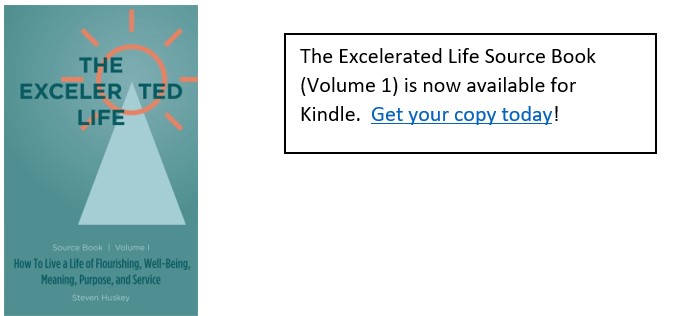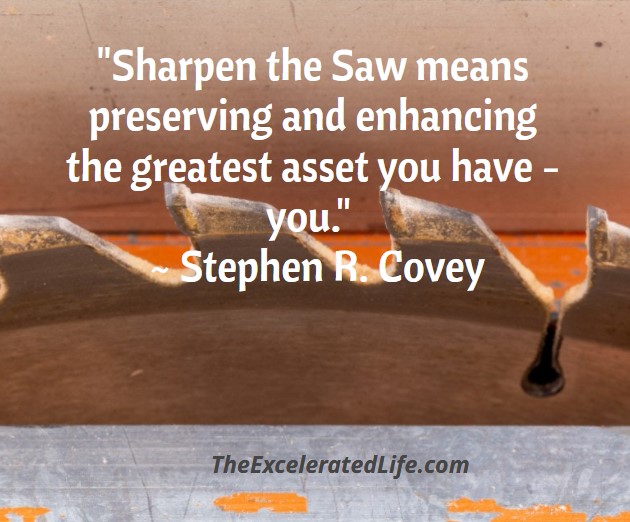Practicing self-care brings improvements in all areas of your life. You’ll feel better, you’ll be in better health, your relationships will be strong, your well-being and life overall will be enhanced. Just as a woodcutter is more effective when he or she takes time out from cutting wood to sharpen his or her saw, you’ll find when you practice your own self-care habits that you are reaping increasing benefits as time goes by.
TheExceleratedLife.com
Title Photo by cottonbro from Pexels
Two Woodcutters
“Give me six hours to chop down a tree and I will spend the first four sharpening the ax.” ~ Abraham Lincoln
Once upon a time, in a logging camp in the northwest woods, two loggers, Abe and Al, got into a heated debate about who was the fastest woodcutter. They decided to have a competition to see who was the fastest. The logger who cut down the most trees in a day would claim the title.
The morning of the contest came and both men went off into the woods to begin chopping. The two were chopping away when Al heard Abe stop. “He’s taking a break already,” Al smiled to himself and begin chopping even harder.
After a quarter of an hour, Al heard Abe’s ax once more. But he was sure he had taken the lead. After another hour of labor, Al was starting to get tired when he heard Abe stop again. “Another break?” Al thought and this seemed to give him renewed energy.
This went on for the whole day. About once every hour or so, Al heard Abe stop work. As the day went on, his confidence grew stronger and stronger. With so many breaks, Abe must be way behind Al reasoned. He had this contest in the bag.
But at the end of the day, Al was astonished (and frankly, a little ticked off) to discover that Abe had cut considerably more wood than he had. “This can’t be possible!” Al cried. “I heard you stop chopping nearly every hour for about 15 minutes or so. How could you possibly have cut down more trees than me?!?”
“It’s simple, really,” Abe replied. “Every time you heard me stop, I was taking time to sharpen my ax.” [1]

What Does “Sharpen The Saw” Mean
While the two characters in our story were using axes to chop wood, the original phrase made famous by Stephen Covey in The 7 Habits Of Highly Effective People is “sharpen the saw”. “Sharpen the ax” means the same thing, but “sharpen the saw” just has a ring to it. So that’s what we’ll use today.
Sharpening the saw, as Stephen Covey presents it, means taking time for balanced self-renewal; balanced across these four dimensions: physical, spiritual, mental, and social/emotional or relationships.
It’s important to keep in mind that you can’t “binge” sharpen. You must take time periodically to sharpen the saw in each of the four areas. And you must do it over and over in ongoing renewal.
To sharpen the saw, Covey says, “means exercising all four dimensions of our nature, regularly and consistently in wise and balanced ways.” [Covey]
Sharpening the saw is anything that will help you renew your energy and keep you balanced.

How Can Sharpening The Saw Help Me?
In another part of The 7 Habits, Covey discusses P/PC balance. P stands for production while PC stands for production capacity. In order to keep producing, you must preserve your production capacity. If you run your car but don’t provide proper maintenance, eventually it will break down and you are faced with expensive repairs. Similarly, if you run yourself without providing proper self-care, eventually, you will break down. Sharpening the saw “means preserving and enhancing the greatest asset you have – you.” [Covey]
When you sharpen the saw day by day, you make the improvements that allow you to continue taking steps forward. Sharpening the saw is the foundation on which to build your self-care habits.
What If I Don’t Take Time To Sharpen The Saw?
The truth is, unless you’re literally cutting wood, you won’t notice any difference at first, whether you sharpen your saw or not. We return to this again and again with Jim Rohn’s two easies.
“It all comes down to a philosophical phrase: the things that are easy to do are also easy not to do. That’s the difference between success and failure, between daydreams and ambitions.” [Rohn]
To maintain consistency, we adopt disciplines to sharpen our individual saws that are simple and easy to do. This has been a life-altering lesson for me. By focusing on and doing simple things every day, I continue to see steady improvements in my health, my relationships, my work, and my overall well-being. It doesn’t happen overnight; in most cases, it has taken months or years.
In the same way, if you don’t do the simple tasks to sharpen your own saw, to take care of yourself in all areas, you won’t see any major failures right away. But slowly, over a span of time, you’ll steadily decline. Your health, your relationships, and the other areas of your life may not be completely broken (although they very well could be), but you will not be flourishing and thriving.
As we saw earlier, if you don’t maintain your car, eventually there’ll be a catastrophic failure. Sharpening the saw is the maintenance you need to continue on the upward path.
How Do I Sharpen The Saw?
Sharpening the saw is personal. We each need certain healthful practices such as exercise, adequate sleep, and healthful food, but how we go about those is tied to individual needs and idiosyncrasies. However, keep in mind the 4 dimensions detailed by Stephen Covey in The 7 Habits.
Physical: exercise, nutrition, stress management.
Practices: get a massage, work out at the gym, eat more fruits and vegetables, _____ (you?)
Mental: reading, visualizing, planning, writing.
Practices: read for pleasure, take a class, visit a museum, learn a new skill, _____ (you?)
Emotional/social: service, empathy, synergy, intrinsic security.
Practices: go out with friends, visit family members, join a yoga or fitness class, _____ (you?)
Spiritual: value clarification & commitment, study & meditation
Practices: meditate, pray, read in the wisdom literature, walk in nature, _____ (you?)
For more ideas and suggestions, Excelerator Jump Start™ – Selffulness: Taking Excellent Care of Yourself provides quick actions you can take right now to begin taking excellent care of yourself. You can download your free copy here.
A Brighter Tomorrow
As we’ve seen, investing time in sharpening the saw and practicing self-care won’t show any returns in the short term. But over time, the improvements you’ll see in all the areas of your life are gratifying. You’ll feel better, you’ll be in better health, your relationships will be strong, your well-being and life overall will be enhanced.
It doesn’t happen overnight and that makes it all the more important that you stick with your self-care practices, even though you won’t notice any differences at first. But just as the woodcutter was more effective when he took time out from cutting wood to sharpen his saw (or ax as the case may be), you’ll find as you continue to practice your own self-care habits that you are reaping increasing benefits as time goes by. And that is embracing your Excelerated Life™!
Excelerated Selffulness™ — taking excellent care of yourself — is one step in creating your Excelerated Life™, a life of flourishing and well-being, and a life of meaning, purpose, and service.
Read more about the Excelerated Life™.
Footnotes:
[1] I adapted this story from Screeble.com. See Resources.
Resources:
Covey, Stephen R. The Seven Habits Of Highly Effective People. New York: Simon & Schuster, 1989.
Rohn, Jim. Leading an Inspired Life. Niles, IL: Nightingale-Conant Corporation, 1997.
Wolya, R. “The Story of Two Woodcutters — Why You Should Sharpen Your Axes.”
Screeble. Screeble.com, . Web. January 29, 2022.
https://screeble.com/blog/2017/03/07/story-of-two-woodcutters/


